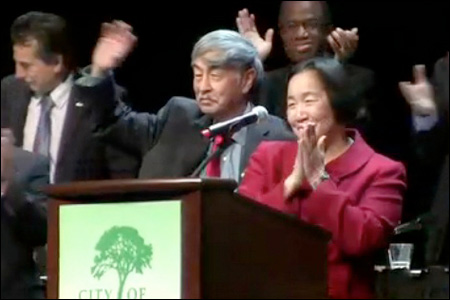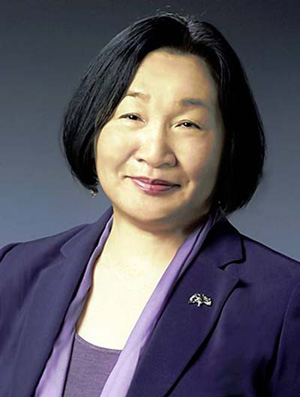Jean Quan, Oakland’s 49th Mayor, is both the first woman and first Asian American to hold the post in the 158 years since the city was incorporated. Quan’s ascension also represents an inspiring ending to a 104-year family saga that began with destitution brought on by the great San Francisco earthquake of 1906 and the intense anti-Chinese racism in its aftermath.
In keeping with the eloquent can-do leadership style that Quan has cultivated during her 20 years in public life she made full use of her family history to rally a city mired in a near-hopeless financial struggle and fighting to emerge from the shadow of its famous neighbor across the Bay. The city’s plight had worsened during the bizarre term of Quan’s predecessor Ron Dellums who was oddly missing in action for most of his troubled term and even failed to show up for Quan’s inauguration pleading “family issues.”

New Oakland mayor Jean Quan and husband Floyd Huen celebrate at her mayoral inauguration on January 3, 2011.
On her first day as Mayor Quan led a ceremonial pre-inaugural walk that traced her family’s history from Oakland’s revitalizing Chinatown to its century-old City Hall.
“My story is just one of the stories in Oakland,” she declared. “Together, we’ll make an epic story in Oakland.”
With family members and a small group of supporters Quan began the walk early at the Lung Kong Tin Yee Association on Ninth Street where her grandfather sought shelter after San Francisco’s Chinatown burned in the quake’s aftermath.
Perhaps the most important stop was Lincoln Elementary School on 11th Street. During the days of segregation it had been designated for black and Asian American children, including Quan’s father. This year it became the first Oakland school to win the National Blue Ribbon award, an award for which Quan can rightly share some credit given her long focus on improving the city’s schools. Noting that the school’s success owed much to the efforts of volunteer tutors, Quan urged everyone to show up in City Hall later that night for an open house and become one of the 2,000 volunteers Quan is seeking to mentor kids as a way to help them stay in school and graduate.
“My number one priority is to put the children at the heart of the politics in Oakland,” she said.
Quan understands better than most that Oakland’s epic challenge is to reconcile and unite its disparate economic strata and racial groups to believe in a city that has struggled to free itself of the poverty- and violence-ridden image it took on during the 1960s and early ’70s. The city’s racial composition is 31% African American, 27% White, 25% Hispanic and 17% Asian American. A yawning gulf separates white and Asian professionals who tend to live in the Hills and commute to San Francisco from African American and Hispanic blue-collar workers who tend to live in the flats and labor at the Port. That gulf has only widened in recent years.
In front of the Malonga Casquelourd Center for the Arts Quan urged “everyone to take a fresh look at Oakland. My goal is going to be to reintroduce Oakland to itself.”
Long before Quan took the oath of office she has worked out her strategy to bring the city together around kids, jobs and safer streets. In her steady, deliberate speaking style Quan communicated her readiness to execute that strategy.
“Whether you supported me for mayor or didn’t support me for mayor, we are family because we love this city,” Quan said to a standing ovation from the crowd filling the Fox Theater where she was inaugurated. They clearly saw her as the mayor Oakland has needed for a long time.
Jean Quan was born on October 21, 1949 in Livermore, some 25 miles east of Oakland. She was only five when her father died, leaving her to help make ends meet by working a variety of part-time jobs while attending junior high and Livemore’s Granada High School. Their plight was made more difficult by the fact that her mother was a recent Chinese immigrant with virtually no English skills. Quan did well enough at Granada High to win a scholarship to UC Berkeley.
Quan’s social activism began at Berkeley where she tutored kids in impoverished West Oakland. She also helped reshape the curricula of universities across America by participating in the Third World Strike of 1969. As a direct result of that strike UC Berkeley and hundreds of campuses around the nation established ethnic studies departments to raise awareness of social issues pertaining to African Americans, Chicanos, Native Americans and Asian Americans.
Quan’s public service began officially in 1990 when she won a seat on the Oakland School Board. In 2002 she was elected to represent District 4 on the Oakland City Council. In the 2010 general election Jean Quan employed an intensively grassroots campaign to narrowly defeat former state senator Don Perata under the city’s unusual new ballot system that lets voters indicate first, second and third choices for mayor. Out of a field of 10 candidates Quan, Don Perata and Rebecca Kaplan were the top 3. Perata led Quan 40,342 to 29,266 in the initial tally but lacked a majority of first-place votes. According to protocol the votes were re-tallied after allocating the votes of third-place Kaplan to Perata and Quan. The resulting tally gave Quan the victory by 51% to 49%.
Jean Quan is married to Floyd Huen whom she met while both were attending UC Berkeley. Huen was president of the Chinese Students Association on campus. He was also active in the Third World Strike. More recently, Huen, a doctor, served as physician for the 1999 UC Berkeley hunger strikers who successfully won their demand for a stronger Ethnic Studies department. The couple have two children.


